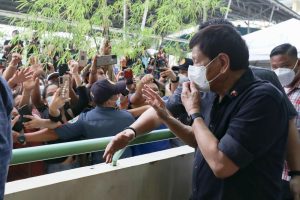Philippine President Rodrigo Duterte has been actively meeting supporters and unveiling infrastructure projects ahead of the end of his term on June 30. But his government also continued to clamp down on critics and activists, reflecting the strongman tactics of his controversial six-year presidency.
While Cabinet members have been reminding the people of Duterte’s legacy, the police and other members of the government’s security cluster seemed intent on further shrinking the country’s civic space.
In Tarlac province, the police arrested 83 individuals who were peacefully supporting agrarian reform beneficiaries in a farm estate linked to a local official. The mass arrest was condemned by the opposition but the government’s anti-communist task force blamed activists for instigating the conflict. Vice President Leni Robredo has issued a statement calling for the release of the farmers and their supporters.
During the same week, the country’s police chief warned that rallies will be dispersed if they come near the oath-taking of incoming President Ferdinand Marcos Jr. on June 30. He added that only pro-government assemblies will be allowed during the inauguration. His statements drew flak from human rights advocates, who reminded him that the police should uphold the constitutionally-guaranteed right to freedom of expression and assembly. He was also told not to narrowly interpret the law to justify the restrictions being planned by the police.
Phil Robertson, deputy Asia director of the New York-based organization Human Rights Watch, chided the police chief for his remarks. “While the police are duty-bound to keep the peace during these activities, this kind of confrontational and aggressive police attitude is uncalled for based on the circumstances of the situation,” he said.
If police are threatening to detain protesters, the National Security Council (NSC) took a step further by ordering telecommunication companies to block 26 websites belonging to independent media outlets, activist groups, and Communist Party-affiliated organizations for allegedly supporting terrorism. The NSC cited the Anti-Terrorism Act, though the law does not mention the shutting down of websites. It compiled a list of groups that are supposedly promoting terrorism but without providing any evidence.
The inclusion of two news websites in the NSC order drew widespread criticism. Local and global media groups have assailed the NSC, which is headed by Duterte, for undermining the public right to information.
“Blocking access to these sites leaves a gap in discourse and in the flow of information and highlights the threats posed by the Anti-Terrorism Law on the freedom of expression and on freedom of the press,” said the National Union of Journalists of the Philippines.
It also mentioned the dangers of “red-tagging” and the way in which the the practice “paints groups and people as legitimate targets for threats, harassment, and physical attacks.”
The issue of red-tagging elicited debate once more after Duterte officials issued contradictory statements on whether this policy endangers the lives of individuals. It may appear that there’s disagreement about the use of red-tagging in the government’s all-out war against communists but the bureaucracy and judicial processes have been weaponized already in support of this practice. Last week, a local court revived charges against a red-tagged community doctor even after the warrant was already previously quashed.
The curtailment of critical voices in online and offline spaces coincided with the announcement of the International Criminal Court (ICC) prosecutor that the pending investigation against Duterte for committing grave crimes against humanity will proceed because of the failure of the Philippine government to conduct genuine investigations into the drug-related killings. As expected, Duterte hit back against the ICC and insisted that his campaign against illegal drugs required the use of violence.
Duterte started his presidency by terrorizing the country as the police brutally enforced the “war on drugs.” Six years later, the government would claim that it succeeded in the campaign against illegal drugs even if the president himself has repeatedly admitted that the drug problem remains a serious problem in the country. But then and now, the Duterte government has been consistent in distorting the meaning of human rights and its important role in democratic governance. His last month in power – which saw mass arrests, online censorship, press freedom violation, and red-tagging – affirmed his enduring legacy as a leader who enabled the rapid deterioration of human rights in the country.













